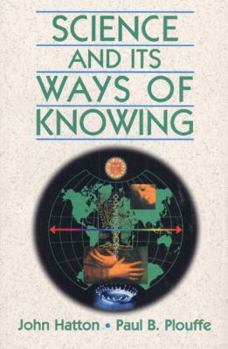Science and Its Ways of Knowing
Select Format
Select Condition 
Book Overview
This broad collection of accessible essays helps readers develop a fuller appreciation of the nature of science and scientific knowledge in general. The focus throughout is on the relationships in... This description may be from another edition of this product.
Format:Paperback
Language:English
ISBN:0132055767
ISBN13:9780132055765
Release Date:December 1996
Publisher:Addison-Wesley
Length:150 Pages
Weight:0.52 lbs.
Dimensions:0.3" x 6.0" x 8.9"
Customer Reviews
2 ratings
The Scientific Method, the Scientist, and Scientific Discovery
Published by Thriftbooks.com User , 17 years ago
In beginning science classes we were told that science is a way of thinking that leads to new knowledge - so far so good. Then we were told that progress toward new knowledge follows the Scientific Method. The Scientific Method has a distinct sequence of elements: observation, hypothesis, and test. What authors John Hatton and Paul Plouffe show in their book Science and its Ways of Knowing is that the scientific process is not as neat, clean, and clear as the Scientific Method suggests. For one thing, science takes place at the intersection of "human reason and imagination" on the one side, and the "evidence" that nature dishes out on the other hand.. The growth of science is the enlargement of that intersection. The area of intersection (science) expands as either human reason and imagination, evidence, or both improve. As an interaction science tells us only the correlation, rather than causation, between human reason and imagination, and evidence. Scientific theories are thus the explanatory power of the interaction that "builds an ever more coherent picture of the physical world and thus extends our understanding of nature's laws" (p. vii). We know a theory is "good" if it consistently shifts the boundary between what is known and what is unknown, i.e., it increases the realm of the known and reduces that of the unknown. Like a good map, a good theory takes you where you want to go at a lower opportunity cost than available alternatives. Although it is common to talk about scientific revolutions, real revolutions are very rare, despite Thomas Kuhn's objections. The "paradigm shifts" that Kuhn writes about are just that - shifts. It makes a lot of sense when Einstein pays homage to the broad scientific shoulders upon which he (builder) and his scientific edifice (general theory of relativity) stand. Scientific progress is cumulative; revolutions would be just too destructive for science. If the preceding statement is correct, than what do individual scientists bring to the practice of science? The authors arrived at this question after first recognizing that the scientific community provides both the driving energy and "communal constraint" to the extension of scientific knowledge. Perhaps because of the constraints "... students in the sciences are seldom asked to think about the nature of scientific knowledge and the ways by which science `knows'" (p.ix). In doing this they miss the point that defining "... varieties of styles, approaches, personalities" (p. ix), events, and moments, matter immensely to the progress of science. That is the point of the book and essays in the book offer to amend that situation. The essays are organized in three major sections. The first set of essays deals with the Scientific Method; the second section focuses on how scientists develop their theories; and the last section concentrates on scientific discovery. Each set of essays is introduced separately which I find good at framing the reader. The intro
As with any compilation, there are highlights and lowlights, but it's always thought-provoking
Published by Thriftbooks.com User , 19 years ago
This book is a compilation of several essays that deal with a variety of science-related topics. Some of these topics are very general - e.g. the scientific method, the nature of science, etc. Others are extremely specific - one describes the race to discover the structure of DNA, another a personal recollection of one biologist's first week of university. There is also a wide range of quality - some essays are too dull to bear, others are so fascinating you wish the author had written more. They are also written to a variety of levels of scientific literacy - some assume little to no specific knowledge of scientific theories or personalities, while others require a good deal (e.g. the essay by Stephen Hawking assumes you know who he is, what his world-view is, and a working knowledge of big bang theory and relativity). As a person with an advanced chemistry degree, but no biology and little physics training, I was easily able to follow all the essays in the book. In fact, the average Grade 12 student who focusses on science (taking, say, chemistry, physics, and biology) should be able to follow anything in the book. Much of the information is speculative and/or controversial. There are essays slamming scientific arrogance and others praising science as the greatest human endeavour. There is an essay ridiculing "creation science," comparing it to Marxism and astrology. There are essays praising the old-fashioned version of the Scientific Method and others that denigrate it as useless. Overall, the average scientist will find this book interesting and illuminating, especially those essays focussing on philosophy of science and other esoteric issues, in spite of the occasional repetition. Perhaps a non-scientist would find the essays on specific scientific areas of more interest than I, but I found them fairly dull. Interestingly, the book seems set up to be used as a text in a philosophy of science class, complete with "discussion questions" at the end of each essay.






